The Ambassador of Ukraine to Greece gave an interview to Kathimerini on the occasion of the anniversary of the Russian invasion. “Black List”, the first actions and a bet on the preservation of the country.
“We were ready, but it was still a big shock. We woke up, talked on the phone with other ambassadors, with the leadership of the Foreign Ministry, and read the news. It didn’t take us long to figure out what was coming full scale invasion“.
Ambassador of Ukraine to Greece Sergey Shutenko spoke with journalists “K” on the occasion of the anniversary of the Russian invasion. We met at the country’s embassy in Psychiko, in an empty large living room with heavy furniture. I ask Mr. Shutenko to describe his first reaction in the morning February 24, 2022 to relive this day a year later. “We understood that this was not an operation on Donbassbut they intended to take over all of Ukraine,” he says, and in his words one can feel excitement, albeit restrained, like that of an experienced diplomat.
“Is it still like today?” I ask, he gives an affirmative answer and continues describing that difficult morning: “At first I realized that we have the Internet in Ukraine, so I could communicate – I didn’t feel lonely share your thoughts with other ambassadors and the Ministry of Foreign Affairs. We realized that we must fight“.
And he continues: “We knew that Russia had”black list”, which included figures from Ukraine, whom she considers enemies – from the government, the military, it even included bloggers and journalists, diplomats at the top of the list. This means that if the invasion is successful, as soon as I return to the country, I will be arrested.”
AP Photo/Efrem Lukatsky
“My first thoughts were to understand how the state apparatus works in wartime, what actions I should take,” said Mr. Shutenko, an active diplomat since 1995. “I know how diplomacy should work, so I knew how to mobilize all possible support in this matter and, of course, contact the Greek government to explain what has been done and that we are working normally. Then I tried to contact the political leadership at all levels.”
In fact, he remembers an incident that was not known at the time: “The next day I went to the presidential palace to meet with the President of the Republic. At the entrance I took a covid test and it was positive. The people in charge of the presidency reacted quickly, organized the room, and we talked on the phone with Ms. Sakellaropoulou from different rooms in the same building .
He says that when he returned to the embassy, he did not worry at all about his personal health: “The only thing that bothered me was that at that moment I would not be able to have personal contacts.” Due to the coronavirus, he did not attend solidarity ralliesthat took place in those days.
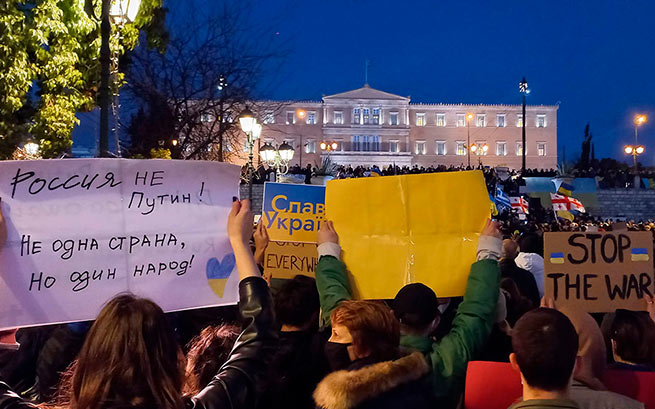
“I was focused on getting any practical and political help. The flow has begun Ukrainian refugees, there was chaos, there was a queue for Promachonas. The Greek government was waiting for the decisions of Brussels in order to agree on its position, ”he notes and describes the pictures of those days. Life has changed dramatically:There were queues at the embassyabout 100 people entered the country in a day“. Some stayed in Serra, in Thessaloniki, many came to Athens asking me what to do. Archbishop Jerome helped us when there were long queues outside, as a field kitchen was organized with the help of the church.”
He notes that the first wave of refugees – mostly women and children – found shelter with relatives and friends.
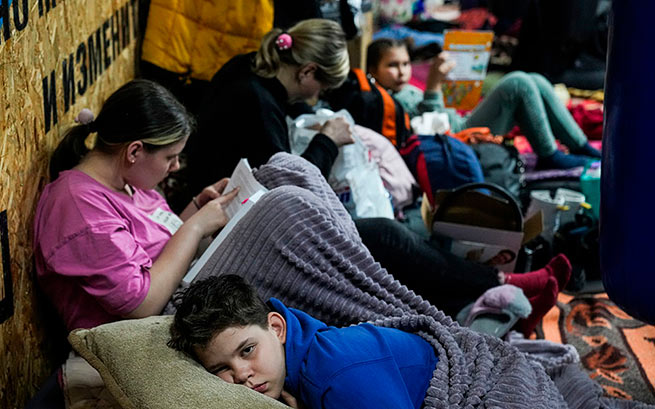
AP Photo/Evgeniy Maloletka
He refers to the experience gained by the embassy during pandemicsemphasizing that, while working in the case of Ukrainian sailors with covid, “we learned how to act in such emergency situations – we established all the necessary contacts, built a network” .
In total, since the beginning of the invasion of Greece, about 25,000 Ukrainians, but some subsequently returned to Ukraine, “to be reunited with their spouses and relatives”. He also adds that some “felt like strangers,” so despite their fear of a harsh winter, they chose to return.
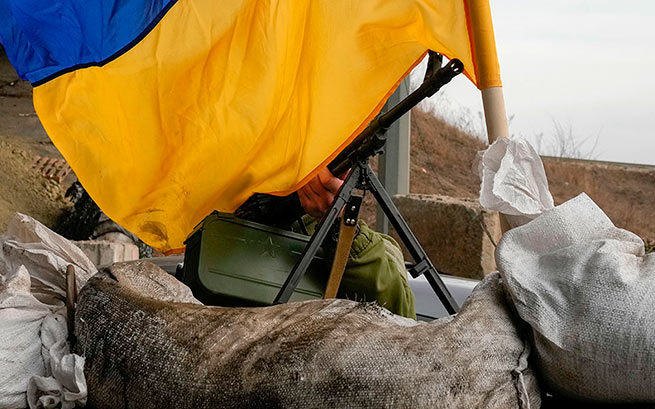
AP Photo/Efrem Lukatsky
“The morale of Ukrainians is high”
The Ambassador of Ukraine recalls the moments of his visit to Kyiv last December, when he first heard sirens: “I felt more fear than the people around me, as I had no experience of my own,” he notes and describes the impressive composure of the employees of the Ministry of Foreign Affairs.
Ukrainians adapted their lives to new conditions, which Mr. Shutenko saw when he went to a restaurant with a friend: the light went out, but the patrons were left under candlelight and with the loud sound of a generator that could be heard from the kitchen.
“The spirit in Ukraine is impressive. From the outside, when you see the situation, you are shocked, depressed. When you arrive there and see their eyes, when you hear how they treat everything with humor, you are impressed and after a few days you also change the rhythm.”
He gives another example when he had to change bank card and he made an appointment with a bank employee, as he had to leave the city immediately afterwards.
“She came to the office with wet hair, in a dressing gown. She says to me: “Please wait 5 minutes” – and enters her office. I could hear the hair dryer from inside and after a while the door opened and it was presentable! She told me she was lucky because she has a generator in her office so when she wakes up she comes here to do her morning chores.”
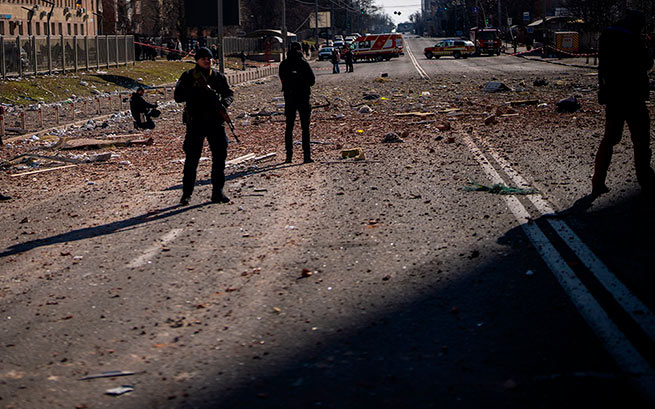
AP Photo/Emilio Morenatti
He notes that those who visit the country are impressed by the fact that Ukrainians are neatclean and well dresseddespite the problems with electricity – they adapted their lives to the new reality.
I ask how the morale of the townspeople: “Very tall!” he replies immediately and with a smile. “Everyone believes that Ukraine will win, the question is when“. They are ready to do everything possible for Ukraine to win.”
Leads the words President Zelensky about not having everyone go to the front lines: “A few days ago, I gave an online lecture at the university and told the students: normal continuation of studies is your contribution to victory“.
“Everyone should help from their position, this is a common spirit in Ukraine, for the country to work‘ he says. He emphasizes fighting spirit of the Ukrainian armybecause she is fighting not “against someone”, but “for the country”: “In the Russian narrative, they are fighting against Nazism, and we are fighting for our country.”
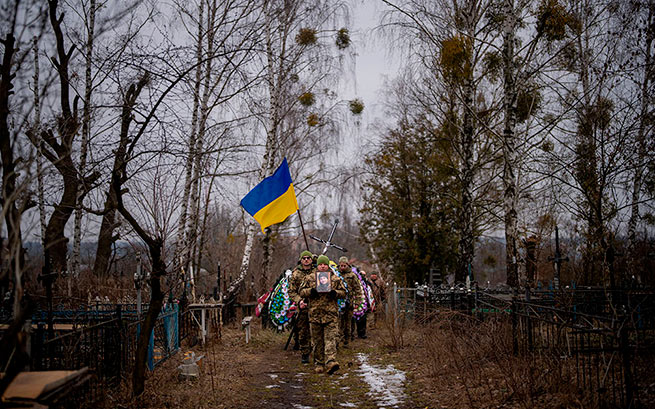
AP Photo/Emilio Morenatti
“Putin is the creator and product of his own narrative”
When asked why Vladimir Putin decided to invade Ukraine, Sergei Shutenko takes us back to the years of the Soviet Unionwhere he lived as a child: “Then for us the darkest guys were from KGB. The selection and training of those entering this service was unnatural – they changed their psychology from the very beginning, since the primary task was to punish their own citizens of the country. It seemed normal to them to kill, imprison, create unimaginable living conditions. They also often use manipulation. So the substrate was already there.”
He went on to say: “Many Russians are obsessed, I’ll call it imperialism And neo-colonialism. Due to the fact that they have lost some territories, they feel the need to be victimized, and at the same time they have a sense of greatness based on their imperialism – that they were a superpower and should do everything to become again. Putin is and creator and product their own narrative — all along, the KGB people have been creating this narrative. In the end, he himself believed it.”
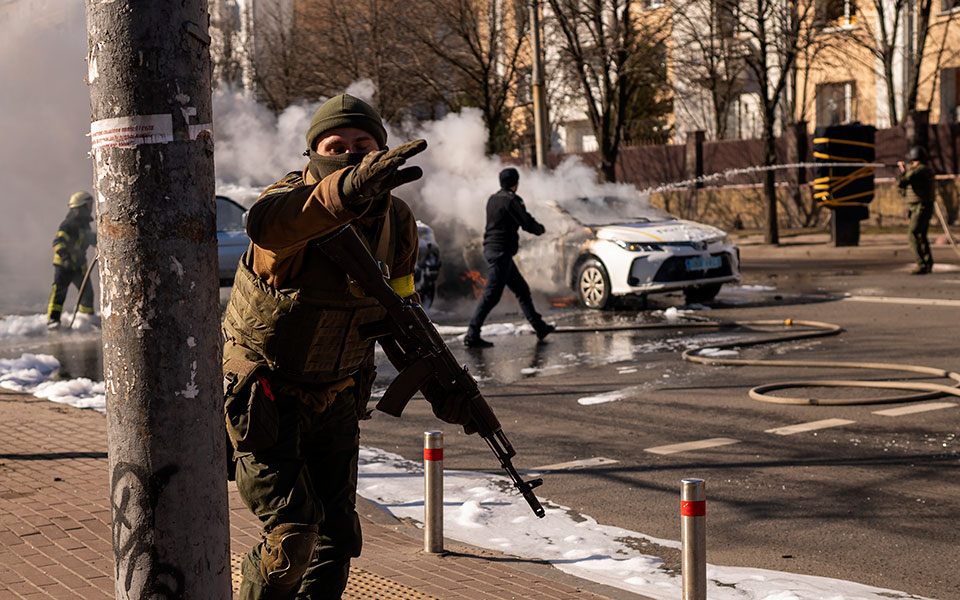
AP Photo/Emilio Morenatti
When asked why the Russian president has strayed so far from his calculations, he replies: “Not only Russia and Putin, international analysts predicted that Kyiv would fall within 24 hours. The President of Russia confused Russian speaking Ukrainians With Ukrainians who love Russia. They convinced him that some kind of nationalists ruled in Kyiv, a vicious circle, and the population sees Russia as a liberator. I believe that one of the reasons why Mariupol was subjected to such intensity and scale of barbarism was that there were many Russian-speaking people there who were neutral about Russian politics. But when the Russian army entered the city, it met with strong resistance from everyone, no one wanted them. The frustration of Putin and the Russians, I suspect, has increased this anger towards the people of Mariupol. Meanwhile, I am surprised to hear the statements of Russian diplomats, for example, Lavrov, that they protect the Russian speakers there – but you destroyed most of the Russian speakers! And whoever they were, they are no more. Now there is the tendency for everyone to speak Ukrainian, so that nothing connects them with Russia“.
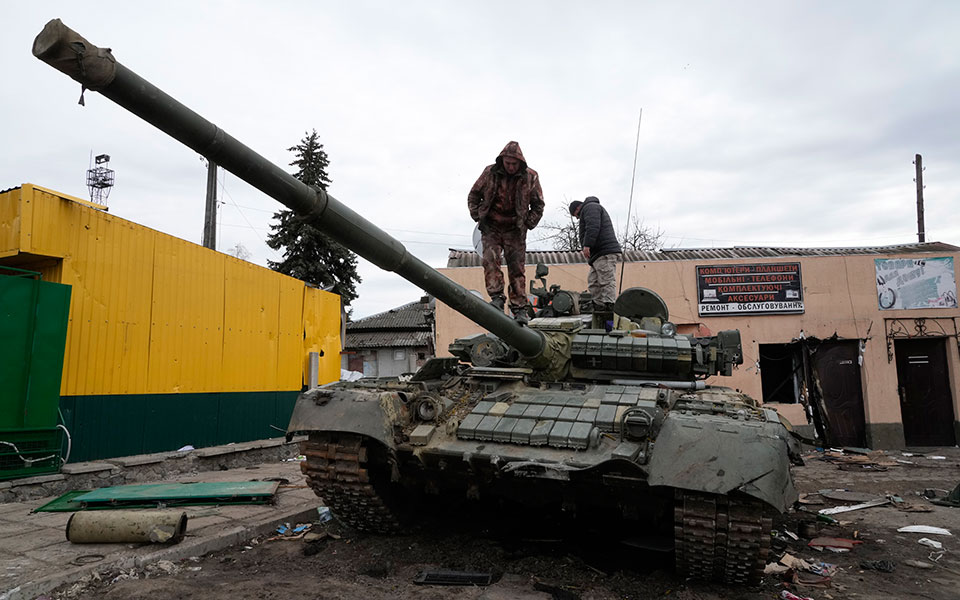
AP Photo/Efrem Lukatsky
The value of life and the “Russian world”
Shortly before the end of our conversation, he again returns to the past: “I lived in the Soviet Union during the war in Afghanistan and heard about the violence of Russian soldiers – I thought it was all from the last century, that the value of life entered the Russian universe, but I was shocked to find that nothing had changed.
“Why are they so cruel?” I ask, and he replies, “I think they have sense of superiority and confidence in impunity. And because they had a poor life, they began to loot. They even stole toilet bowls from toilets“.
“Can hatred be defeated?” – the next question, and Mr. Shutenko directly answers: “In for the foreseeable future, no.
“Does the average Ukrainian hate the average Russian?”. “Yes… We blame them because they are silent, they don’t protest, they don’t say anything about the war, even after so many human casualties. For many, it is a conscious choice to sacrifice their freedom, they agree with the decisions of their government. Look at those Russians who left the country to avoid conscription – they are not against the war, they are against their own participation in the war“.
“Have you ever felt the need to return to Ukraine and fight?” I ask, and he immediately replies, “Yes,” adding that, as an ambassador, he also participates in the struggle of his country. “If you are doing your job efficiently – you keep doing it, you should not leave it because of your feelings that prompt you to leave your post and go to war.”
He believes that Ukraine’s victory will come not when the Russian army leaves, but when the time comes for justice and accountability for those responsible, when there is a guarantee that the same scenario will not happen again, that “there will be punishments”, this will work as an example.”
Translation “Athenian News”.
Original publication cathimerini.



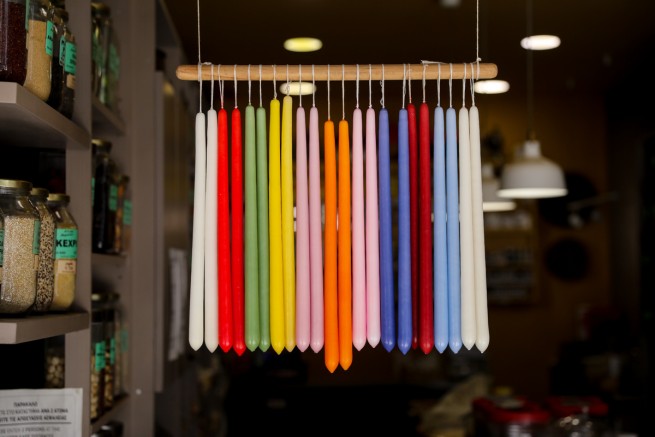

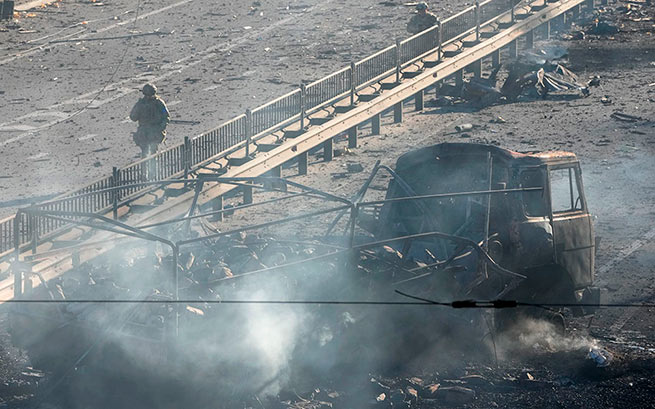

More Stories
Today the world remembers the accident at the Chernobyl nuclear power plant
A trial has begun in the case of a fatal accident involving Dora Bakoyanni's car.
Poll: which European countries are ready to defend their homeland to the last